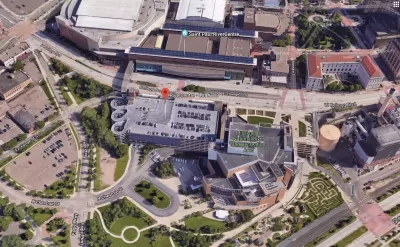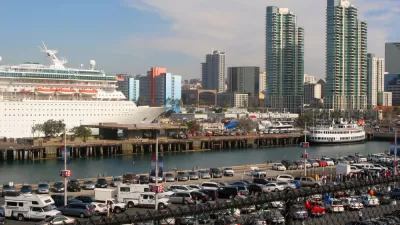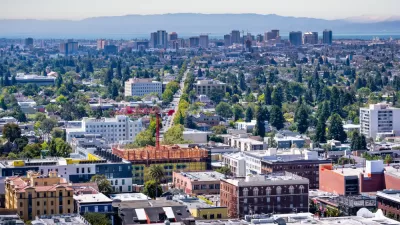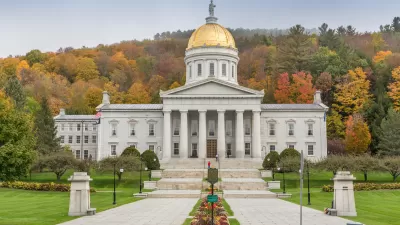Two options for significant parking reforms are under consideration in St. Paul. The City Council could decide to eliminate parking requirements entirely as soon as this summer.

Frederick Melo reports on the ongoing efforts to relax parking requirements in the Twin Cities—where both cities have already relaxed parking requirements along transit corridors.
Efforts to reduce parking requirements in Minneapolis in keeping with the vision of the Minneapolis 2040 Comprehensive Plan were documented by Planetizen in April 2021. The cities have a history of working together on planning efforts, most recently when both cities acted simultaneously to lower speed limits.
Melo's article offers more details about the effort to reduce parking requirements in St. Paul. "Senior St. Paul city planner Tony Johnson has been shopping a presentation on a city parking study to neighborhood district councils, and recently presented the same materials to the St. Paul Planning Commission, which will consider how to adjust the zoning rules in the weeks ahead." The St. Paul City Council is likely to consider the parking reform package this summer.
As for the details of the parking reforms under consideration in St. Paul, two options are in play. According to Melo, "the first option recommended by the parking study would reduce minimum parking requirements for developers, and allow for further reductions if they invest in alternatives to vehicular travel, such as subsidizing transit passes."
"The second option would eliminate parking minimums entirely, though it would not prevent developers from building parking if they wish."
In addition to breaking the news about the status of St. Paul's parking reform effort, the article also serves to introduce the concept, providing a recent history of cities that have achieved parking reforms and the math on how much costs to provide off-street parking for developments in St. Paul.
FULL STORY: For new development, St. Paul weighs reducing (or ditching) parking minimums

Alabama: Trump Terminates Settlements for Black Communities Harmed By Raw Sewage
Trump deemed the landmark civil rights agreement “illegal DEI and environmental justice policy.”

Study: Maui’s Plan to Convert Vacation Rentals to Long-Term Housing Could Cause Nearly $1 Billion Economic Loss
The plan would reduce visitor accommodation by 25% resulting in 1,900 jobs lost.

Planetizen Federal Action Tracker
A weekly monitor of how Trump’s orders and actions are impacting planners and planning in America.

Wind Energy on the Rise Despite Federal Policy Reversal
The Trump administration is revoking federal support for renewable energy, but demand for new projects continues unabated.

Passengers Flock to Caltrain After Electrification
The new electric trains are running faster and more reliably, leading to strong ridership growth on the Bay Area rail system.

Texas Churches Rally Behind ‘Yes in God’s Back Yard’ Legislation
Religious leaders want the state to reduce zoning regulations to streamline leasing church-owned land to housing developers.
Urban Design for Planners 1: Software Tools
This six-course series explores essential urban design concepts using open source software and equips planners with the tools they need to participate fully in the urban design process.
Planning for Universal Design
Learn the tools for implementing Universal Design in planning regulations.
Caltrans
Smith Gee Studio
Institute for Housing and Urban Development Studies (IHS)
City of Grandview
Harvard GSD Executive Education
Toledo-Lucas County Plan Commissions
Salt Lake City
NYU Wagner Graduate School of Public Service





























